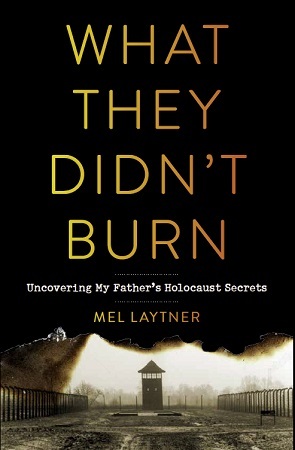Darcia Helle's Blog, page 31
November 8, 2021
Spotlight on CLIFF DIVER: A Detective Emilia Cruz Mystery by Carmen Amato
 Acapulco’s first female police detective dives into an ocean of secrets, lies, and murder when she investigates her own lieutenant’s death.
Acapulco’s first female police detective dives into an ocean of secrets, lies, and murder when she investigates her own lieutenant’s death. In this explosive start to the award-winning Detective Emilia Cruz mystery series set in Acapulco, Emilia beat the odds to become the resort city’s first female police detective. But she’s living in a pressure cooker. Other detectives are scheming to push her out and the police department is riddled with corruption and drug cartel influence.
In this explosive start to the award-winning Detective Emilia Cruz mystery series set in Acapulco, Emilia beat the odds to become the resort city’s first female police detective. But she’s living in a pressure cooker. Other detectives are scheming to push her out and the police department is riddled with corruption and drug cartel influence.
When the lieutenant is murdered, Emilia is assigned to lead the investigation. Soon the man’s sordid sex life, money laundering, and involvement in a kidnapping double-cross combine to create an ugly mess no one wants exposed. The high profile murder case could wreck Emilia’s career. When another detective–Emilia’s worst enemy in the squadroom–emerges as the prime suspect, keeping her job might be the least of her worries.
Readers who love international mystery series crime fighters including Armand Gamache, Harry Hole, Guido Brunetti, and the Department Q series will also love Detective Emilia Cruz’s complex plots, pulse-pounding suspense, and exotic location. Perfect for lovers of detective fiction by Ian Rankin, Jo Nesbo, and Peter May, as well as Don Winslow’s Mexican cartel and border thrillers.
“Consistently exciting”
— Kirkus Reviews
“A wonderful crime mystery”
— MysterySequels.com
Poison Cup award, Outstanding Series 2019 and 2020
— CrimeMasters of America
Book Details:Genre: Mystery, Police Procedural
Published by: Laurel & Croton
Publication Date: September 2021 (first published January 27, 2013)
Number of Pages: 302
ISBN: 1482308045 (ISBN13: 9781482308044)
Series: Emilia Cruz Mysteries #1
Purchase Links: Amazon | Barnes & Noble | Goodreads
Read an excerpt:
The two newcomers surveyed the squadroom. One of them looked vaguely familiar, as if he’d been in the newspaper lately. He was in his late thirties, with longish dark hair slicked back from a high forehead and the sort of angular cheekbones that spoke of a strong indio heritage. He wore a black leather blazer over a black tee shirt and cuffed pants. There was a slight bulge under the left arm.
Emilia stopped typing. The man exuded power.
The other man was bigger and blockier, with a square chin and a nose that had been broken too many times. He was also well dressed in expensive casual clothing.
“I’m looking for a Detective Cruz,” the black-clad man announced.
Emilia felt all eyes shift to her. But before she could say anything Silvio crossed the room. “Detective Franco Silvio,” he said to the man in black.
“I know who you are,” the man replied. “I’m here to talk to Cruz.”
Emilia slowly stood up.
“In the office.” The man jerked his chin at Emilia and then he and his cohort pushed past Silvio and headed into el teniente’s office.
Silvio swung over to Emilia. “What the fuck’s this?” he hissed.
“I don’t know,” she flashed back. Rico came to stand next to her and Silvio gave him a what-the-fuck-do-you-think-you’re-doing look but Rico stood his ground.
The three of them went into the office. The man in black sat in el teniente’s chair and jiggled the locked desk drawers. “Shut the door,” he said without looking up.
Silvio complied and the man came out from behind the desk.
“Do you know who I am?” he asked Emilia.
Emilia gave her head a tight shake. With five people in the room it felt crowded and Emilia felt that cold spurt of wariness she always did when she was the only woman in a crowd of unfriendly men. “I’m sorry, señor.”
“I’m Victor Obregon Sosa, the head of the police union for the state of Guerrero,” he announced. “This is my deputy, Miguel Villahermosa.” The other man didn’t acknowledge the introduction but it was clear Obregon had not expected him to do so. “We’re here to make sure that the investigation into Fausto Inocente’s death is handled properly.”
Rico bristled, as if he was offended that the union would butt in. Emilia waited for him to say something stupid but Silvio shot him a murderous glare and Rico kept his mouth shut.
“We’re barely two hours into the investigation,” Silvio said, obviously making an effort to keep his temper. It had been less than 40 minutes since the call to the chief of police. “It came in as a routine dispatch call. Cruz and Portillo were given the assignment, made the discovery, locked down the scene, and notified the next of kin.”
“So let’s hear it,” Obregon said and flapped a hand.
Silvio nodded at Rico.
“We got a report of a drifting boat,” Rico began. “It was off the beach at the Palacio Réal hotel–.”
“No,” Obregon interrupted. He folded his arms. “Cruz.”
Emilia stole a look at Rico. His face was like thunder. She swallowed hard. “As my partner said, the call was to investigate a drifting boat off the beach at the Palacio Réal. The hotel chef and manager saw it from the beach early this morning, thought there were bloodstains on the side. We met Water Patrol at the hotel and they towed in the boat.” She took another breath and tried to sound as professional as possible. “Lt. Inocente was in the bottom of the boat, with his head encased in a plastic bag. It was pulled tight and knotted around his neck. When the crime scene technician opened the bag it appeared that the back of his head was caved in. We’ll know more when the coroner examines the body.”
Obregon nodded. “Any other injuries?” he asked her.
She shook her head. “No bullet holes in the hull of the boat, no evidence of a struggle. Blood on the deck under the body, likely from the head wound. Blood had also soaked through his shirt and there was some on the upper edge of the boat hull. Technicians took samples but they’ll probably all come back as his.”
“Anything else?”
“The boat is his. His wife gave us the registration papers.” Emilia paused, discomfited by Obregon’s stare. The tension in the room was palpable. She glanced at Rico and plowed on. “They live in the same area as the hotel. The wife wasn’t much help regarding his whereabouts last night. The last person who could pinpoint his whereabouts last night was their maid. Said he got a phone call late in the evening and went out. Took the boat keys but nothing else.”
“Wife didn’t see him?”
“She had gone out to a charity event,” Emilia said. “Of course, we’ll be checking to verify her story.”
Obregon tipped the chair back. A thin silver chain showed inside the loose neck of the tee. His skin was smooth and his jaw was tightly defined. He looked like someone who worked out a lot. And liked showing off the results.
“So, Cruz, tell me how you’re going to proceed,” he said, as if Rico and Silvio weren’t even in the crowded office.
“We’ll set up a hotline and get detectives out talking to everyone at his apartment building and the hotel to see if we can piece together his last hour. He was apparently close to his brother. We’ll talk to him as well. Look at his phone records to see if we can find out who the late night caller was. Coroner’s report. Forensics on his laptop. See if we get any prints off the boat.”
Obregon nodded and straightened the chair. Even that simple movement belied grace and power and focused intent. “This is how the investigation is going to go.” He pointed at Emilia. “You’re appointed acting lieutenant. Do whatever you want with these clowns”–he snapped his fingers at Silvio and Rico–“and the other cases you’ve got but I want you to personally head the Inocente investigation.”
Both Silvio and Rico froze as if they couldn’t believe what they’d just heard.
“Chief Salazar has already been notified. You’ll report directly to my office every few days until this thing is over.” Obregon indicated Villahermosa who’d remained by the door during the entire conversation, like a large, menacing statue. Obregon’s deputy was even bigger than Silvio, with legs the size of tree trunks. Another former boxer, no doubt. “Villahermosa will be on call to assist as well.”
The tension in the room was now tinged with menace. Emilia struggled to keep breathing normally.
“Cruz is a junior detective.” Silvio’s voice was tight. “She doesn’t have the experience or the seniority to be acting lieutenant.”
“Cruz has my full support,” Obregon said.
“With respect,” Silvio said. “We understand that. But she’s not the senior detective here.”
“Nobody’s asking for your fucking opinion,” Obregon blazed. His eyes drilled into Silvio. “Cruz is in charge as of now. Thanks for coming.”
Villahermosa pulled open the door and jerked his chin at Silvio and Rico. They both walked out.
Emilia stood rooted to the spot as her mind jumped around. Why had he chosen her? Did the union have the authority to put her in this position?
Obregon motioned to Villahermosa and the man left the office, too. And then it was just Obregon and Emilia. He walked round the desk again and rifled through a few of the papers on the desktop.
“The mayor has a press conference tomorrow and she’ll want to say something about the Inocente investigation,” Obregon said as he looked through the papers. “Be nice if you could have this all wrapped up by then.”
Emilia felt as if she’d been gutted. She forced a single word out around the tightness in her throat and the dryness in her mouth. “Sure.”
She must have sounded sassier than she felt because he looked up and laughed. “At any rate, we’ll meet beforehand to review what you’re going to tell her. Let’s say tomorrow 4:00 pm.”
He glanced at his watch, an expensive-looking silver job with three knobs on the side. “That gives you more than 24 hours to come up with something significant.”
Emilia licked her lips. “I won’t even have the phone records by then.”
“You’ll have something for the press conference,” Obregon said nastily. “Some nice sound bite about the diligence of the Acapulco police and how they’re sad but determined.”
“You want me to say this to the mayor?”
“Inocente was as dirty as they come.” Obregon turned his attention back to the overflowing inbox. “You’re going to turn up a lot of bad things. When you do, you tell me or Villahermosa. Not the other detectives and not the chief of police. You don’t arrest anybody, you don’t get yourself shot, you don’t do anything. I’ll take care of that part.”
Emilia’s heart hammered like a warning bell in her chest. “I think Silvio should be in charge of this investigation. He’s the senior detective.”
“If you find that the wife popped him,” Obregon went on. “And you know it beyond a shadow of a doubt, go ahead and arrest her. Otherwise come to me first. Nobody else.”
“Did you hear what I said?” Emilia said.
“I’m trying to clean up the police in this state,” Obregon said as he plucked a folder out of the box. As he flipped it open his hands knotted with veins, as if he had a lot of practice clenching and unclenching his fists. “I’m sick of the corruption and men like Inocente making deals with the cartels. People like him protect their empires, feed it with drugs and private armies. When you find out who killed Inocente we can probably roll up whatever cartel he was in bed with.”
“Why me?” Emilia asked. She was talking to his bent head as if he couldn’t be bothered to look her in the eye. The warning bell was deafening and Emilia knew she had to get herself out of this situation. Silvio should have this job. Or Loyola. They’d know how to deal with Obregon as well as how to conduct a major murder investigation. “You heard what Silvio said. Almost all the detectives out there are senior to me. There will be a lot of resistance. From all the other detectives. Enough to keep the investigation from going forward.”
“You’ll handle it.” Obregon read something else out of the inbox.
“You don’t understand.” Emilia slammed her hand down on the desktop to get his attention.
“Good,” he said, finally looking up from whatever he’d been reading. “You’ve got a fire in the belly. You get those detectives talking to everybody in that fucking hotel. Everybody who lived near him. Whoever even heard of Fausto Inocente. And if the boys don’t do what you say, shoot one of them. The rest will fall in line.”
He was serious.
“I don’t know who you think I am, señor,” Emilia gulped. “But I’ve only been a detective for two years. Mostly I’ve handled the crap cases. You need a seasoned investigator on this one. Get one of the other detectives to be acting lieutenant.”
“You’ve made quite a mark in two years, whether you know it or not,” Obregon said. “Recovering the Morelos de Gama child was a big deal.”
“The media made it out to be more than it was,” Emilia parried. “The case was handled in Ixtapa, not here.”
“We’ve been watching you.” He tossed the file onto the desk and regarded her. “Our girl detective. You’re a hungry one. You want to get someplace.”
“I’m sorry,” Emilia said. “Not this.”
“You’re the only woman here.” Obregon’s glance was searing.
“This is because I’m a woman?”
“Yes. Everybody knows women are less corrupt.” Obregon came around the side of the desk and Emilia resisted the urge to shrink away from him. “You do this or you won’t even be able to be hired on as the lowliest transito cop in any police force in this state.”
He leaned down and put his face close to hers. “You know he was corrupt. Up to his neck in shit. Well, I’m the person putting an end to it in the state of Guerrero, and you don’t get to choose sides.”
Emilia didn’t move. It was hard to breathe. He smelled like leather and cigarettes and an unexpected whiff of spicy cologne.
“I’ll be calling you on this office phone so you’d better move in today.” Obregon stepped back and ran an appraising eye down Emilia’s body. “And look good tomorrow. You want the mayor to take you seriously.”
“I’m junior around here,” Emilia said stubbornly. “You want a fast result, you get Silvio.”
“Maybe I wasn’t clear enough for you, Cruz.” Obregon’s voice was flat. “If the union puts you and your mother out on the street you won’t work as a whore in this town much less as a transito. So you show up and be nice to the mayor and tell her something clever for her little television press conference. How you’re working night and day to solve this terrible crime and keep Acapulco safe for the tourists.”
They stared at each other for a long moment.
You and your mother struck home for Emilia, as no doubt it was intended to.
“I want doors on the stalls in the detectives’ bathroom,” Emilia heard herself say. “And a copier that works. And paper for it. And ink.”
The corner of Obregon’s mouth twitched. “Anything else?”
“I’ll let you know,” she said tightly.
Obregon handed Emilia a card. There were two cell phone numbers printed on it. “You only use these numbers to get in touch with me,” he said.
Before she could respond he pulled open the door and shouted “Attention.”
Emilia followed Obregon as far as the doorway. The detectives were all there, as was Villahermosa. Obregon strode to the center of the squadroom, commanding everyone’s attention.
“Most of you know me. I am Victor Obregon Sosa, the head of the police union for the state of Guerrero.” He revolved slowly and most of the detectives stood a little straighter as his eye rested on them for a moment, creating the same malice-tinged tension he’d first brought into the squadroom. “As you know, Lt. Inocente was found dead this morning. His death will be investigated as a homicide by this unit until his murderer is found and dealt with.”
There was a low sound of shuffling feet. Somebody coughed.
Obregon jerked his chin in the direction of Lt. Inocente’s office where Emilia leaned awkwardly against the doorjamb. “Detective Emilia Cruz will be acting lieutenant for the duration and in charge of the investigation into Lt. Inocente’s death.”
Eyes swiveled to Emilia. Rico was openly shocked as he sat on the end of his desk. Silvio’s face was like granite. He was the only one who kept his gaze on Obregon.
Emilia didn’t acknowledge the stares. She kept her eyes on the ancient copier.
Several of the detectives shifted uncomfortably in the silence. “One of our own has died,” Obregon said. “And we will conduct a thorough investigation, find whoever did this, and punish them according to the full measure of Mexican law.”
He nodded at Emilia. “See you tomorrow, Cruz. Four o’clock.” His eyes revealed nothing. “Good luck.”
Obregon and Villahermosa walked out. As soon as the door shut behind them the squadroom erupted into a bedlam of shouting.
***
Excerpt from Cliff Diver by Carmen Amato. Copyright 2021 by Carmen Amato. Reproduced with permission from Carmen Amato. All rights reserved.
Interview with Carmen AmatoTell us about your main character.
CLIFF DIVER is the first book in the Detective Emilia Cruz series set in Acapulco, Mexico.
Emilia is the first female police detective in Acapulco. A street cop for nearly a dozen years before she made detective, she grew up poor in a rough neighborhood in the home of her aunt and uncle. Her widowed mother had a nervous breakdown when Emilia was a toddler and never really recovered. Emilia followed her cousins into the police department but rose more quickly than either of them.
Now, as the first female police detective, she faces drug cartels, official corruption and as much machismo as her male colleagues can dish out. But Emilia isn’t going to quit. She’s tough on the outside–a kickboxer and swimmer, too–but second guesses herself on the inside and is afraid of opening herself up to hotel manager Kurt Rucker.
But when she’s forced to investigate the murder of her own lieutenant, Emilia will be tested as never before. Hanging onto her job will be the least of her problems.
Which is your favorite minor character and why?
Senior to Emilia, Franco Silvio is the de facto leader in the detectives squadroom. He’s a former heavyweight boxer who has retained the muscle and menace of that profession. He doesn’t want a woman in the squadroom and isn’t shy about letting everyone know Emilia doesn’t belong there.
Yet, they have to work together. Writing their arguments is incredibly fun.
Silvio is in all of the Detective Emilia Cruz books (CLIFF DIVER, HAT DANCE, DIABLO NIGHTS, KING PESO, PACIFIC REAPER, 43 MISSING, RUSSIAN MOJITO, NARCO NOIR, etc.) and their relationship develops over time as they fight, share meals, solve crimes, and help each other get past personal crises.
Your character is at a bookstore. Which section is she shopping in? Which book is in her hand right now?
If Emilia is at a bookstore, she’s in the Self Help section, looking for a book on how to improve interpersonal relationships without having to change herself.
She wants to have a romance with Kurt Rucker without making a commitment. She wants to work with Silvio without giving an inch or compromising. Plus, she’s not averse to lying to get herself out of trouble.
Emilia might try reading MEN ARE FROM MARS, WOMEN ARE FROM VENUS, but I don’t think it will help.
Please share a few favorite lines or one paragraph.
Here’s a pivotal moment from CLIFF DIVER:
Emilia opened her rear door, only to have Silvio shove his way into the backseat with her. Before she could scramble to the opposite door, he pressed the key fob. The locks clicked.
“We need to talk,” he said.
“Sure.” Emilia’s heart crawled into her throat. Damn Rico. He and Fuentes had disappeared into the station. The security guard was in his shack. No help there, either.
“Why did you go to my house?”
“Who says I was anywhere near your house?”
“My wife is pretty accurate in her descriptions.”
“I . . .” Emilia faltered. Silvio was calm but obviously angry. Emilia felt the reassuring pressure of her gun under her jacket.
“You got Inocente’s phone records,” Silvio said flatly.
“You called Lt. Inocente the night of his death,” Emilia said. “From your cell phone. Twice.”
“You think I killed him?” Silvio asked.
“His last known contact is you.” Sweat dampened her hairline. “Takes your call, walks out and never comes back. Dead the next morning. You don’t mention it to anybody, just let us run around trying to figure it out, knowing that we’d see the phone records sooner or later.”
Silvio didn’t move. Emilia had a sudden memory of how surprised Lt. Inocente had looked when the crime scene technician tore open the plastic bag. The dead man couldn’t believe that someone he trusted could have done this to him.
Tell us about your process for naming your characters.
When we lived in Central America, the newspapers published lists of people who defaulted on loans or mortgages. I cut the notices out of the newspapers and made a binder full of these lists of names.
Now when I’m writing the Detective Emilia Cruz series, I pull from these lists to name characters. They all owe somebody something . . .
Every character gets a name before they enter the story. I may also clip a picture from a newspaper or magazine to give them a face, too. This helps me amp up the drama of their description.
Do you write a book sequentially, from beginning to end? Or do you sometimes write scenes out of order?
I wrote my first book, the political thriller THE HIDDEN LIGHT OF MEXICO CITY, by starting in the middle and spreading out from there. It was a terribly disorganized way to go about the task but, hey, what did I know?
Fast forward a few years and I’m much more organized, starting each project with a solid outline. I generally write from start to finish, aiming for an initial draft that can be edited into a readable mystery.
Given that my mystery novels often have multiple plot elements that must get tied up at the end, an outline is essential. I love complexity.
If your personality was a color, what would it be?
I’m an introvert, but my color is red. There’s something red in every room of my house.
I love high contrast, complex concepts, and juggling multiple projects.
Which books have most influenced you?
I think my love of mysteries started with the Beverly Gray mystery series by Clair Blank. Most people know Nancy Drew and Trixie Belden, but the Beverly Gray books came first. The series started with Beverly as a college freshman. Later Beverly becomes a crime-solving reporter in New York City.
The dialogue was clever and foreign locations were a frequent feature. Her circle of friends were surprisingly well-written characters. Plots were somewhat campy, often involving Beverly getting kidnapped, inheriting something, or running afoul of a jewel thief.
The first one I read was BEVERLY GRAY’S FORTUNE, which I found on a shelf in my grandfather’s house. I eventually found most of the series in used bookstores and shared them with my daughter who loved Beverly and her friends, too.
Do you prefer cats or dogs?
About the AuthorDogs!
We have three rescue dogs, making for a noisy but happy household. Dutch is a mixed breed that we call “attention hound.” There’s some German Shepherd, Labrador, and Beagle in there, with a curly tail like a Husky. He loves to nap next to my desk while I write.
Hazel is a haughty German Shepherd who believes she is Queen of Everything. She keeps the other dogs in line. All the toys belong to her.
Bear is the newest member of the pack. He’s a young all-white German Shepherd; the most gorgeous dog I’ve ever seen. He has a great personality, too.
He’s got a couple of nicknames, including Polar Bear and Polar Express. My husband calls him “Mr. Love and Trouble,” because Bear wants to kiss everybody but gets himself into trouble in stealthy ways. He figured out how to step on the pedal to open the trash can, press the door handle to open a door, etc.

Carmen Amato turns lessons from a 30-year career with the Central Intelligence Agency into crime fiction loaded with intrigue and deception.”
Her award-winning Detective Emilia Cruz mystery series pits the first female police detective in Acapulco against Mexico’s drug cartels, government corruption, and social inequality.
Described as “A thrilling series” by National Public Radio, the Detective Emilia Cruz series was awarded the Poison Cup for Outstanding Series from CrimeMasters of America in both 2019 and 2020 and has been optioned for television.
Originally from upstate New York, Carmen was educated there as well as in Virginia and Paris, France, while experiences in Mexico and Central America ignited her writing career.
Her family tree includes a mayor, a Mensa genius, and the first homicide in the state of Connecticut with an automatic weapon. The perpetrator, her great-grandfather, eluded a state-wide manhunt after killing two people–one of whom was his wife. He was never brought to justice. Carmen is a recipient of both the National Intelligence Award and the Career Intelligence Medal.
Grab a free copy of the Detective Emilia Cruz Starter Library at CarmenAmato.net.
You’ll see why Amazon Hall of Fame reviewer Grady Harp wrote: “For pure entertainment and a gripping story likely resulting in nail biting, read Carmen Amato’s addictive prose. She knows this territory like a jaguar!”
Catch Up With Carmen:CarmenAmato.net
Goodreads
BookBub – @CarmenAmato
Instagram – @authorcarmenamato
Facebook – @authorcarmenamato
Tour Participants:
Visit these other great hosts on this tour for more great reviews, interviews, guest posts, and giveaways!
Enter to Win:This is a rafflecopter giveaway hosted by Partners in Crime Virtual Book Tours for Carmen Amato. There will be 1 winner of one (1) Gift box of 5 best-selling mystery/thriller books by various authors hand-selected by Carmen Amato, plus a signed copy of the latest book in the Detective Emilia Cruz series AND a $20 Amazon.com gift card (U.S. ONLY). The giveaway runs November 1 through December 3, 2021. Void where prohibited.
Get More Great Reads at Partners In Crime Virtual Book Tours
The post Spotlight on CLIFF DIVER: A Detective Emilia Cruz Mystery by Carmen Amato appeared first on Quiet Fury Books.
Audiobook Review — GUTTER MAGE by J.S. Kelley, Read by Tanis Parenteau
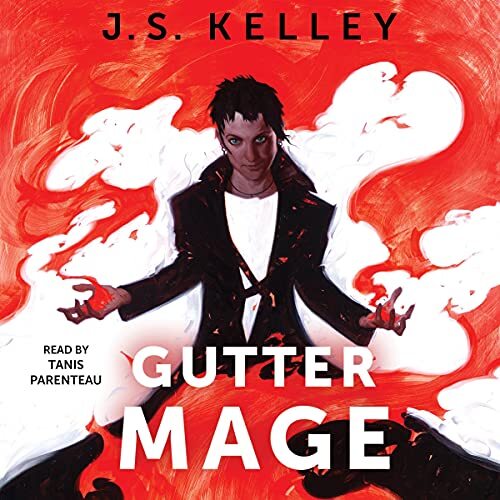
In a kingdom where magic fuels everything from street lamps to horseless carriages, the mage guilds of Penador wield power equal to the king himself. So when Lord Edmund’s infant son is kidnapped by the ruthless Alath Guild, he turns to the one person who’s feared by even the most magically adept: Rosalind Featherstone, a.k.a. the Gutter Mage.
But as Roz delves into the circumstances behind the child’s disappearance, she uncovers an old enemy from her traumatic past and a long-brewing plot that could lead to the death of countless innocents, as well as the complete collapse of Penadorian society itself!
Published: September 2021
My ThoughtsRead Gutter Mage if you like a foul-mouthed, funny, badass female lead. For the record, I loved her.
This is fantasy, set in kingdoms run by royalty, and guilds of mages with a variety of magic.
It’s also perfectly executed noir fiction featuring a complex mystery, with a strong helping of action and adventure.
The cast of characters are all well developed, interesting, unique people.
I was totally hooked from beginning to end. This book deserves so much more attention than it’s currently receiving.
I listened to this on audio, via Scribd, and it’s incredibly well done. The narrator embodies the lead character’s personality. I felt it.

The post Audiobook Review — GUTTER MAGE by J.S. Kelley, Read by Tanis Parenteau appeared first on Quiet Fury Books.
November 7, 2021
Book Review — BLACK CANVAS by Laura Rossi
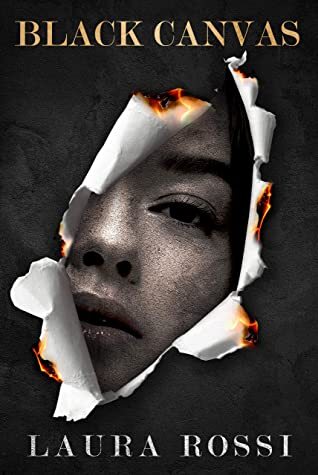
“I dream of waking up and being someone else—my hair, my eyes, even my voice, completely different—and each time I go to the mirror to check my reflection, to see what I look like, I’m her. Every time. Her. It’s her reflection that stares back at me, but I’m the one who controls it. I’m in control, and that’s exactly why it feels so good. I control her and what happens to me; I control both lives—mine and hers—and I have what I want the most: her looks, her status, her marriage. There’s nothing left of me, and only I know the secret. Only I know it’s me inside, it’s me under that perfect porcelain skin, it’s me behind those sweet, smart deep brown eyes. And I have him. He’s mine—just mine now. I’m not the other woman anymore. I’m everything he needs.”
Published: February 2021
My ThoughtsBlack Canvas is a slow burn kind of madness that kept me off balance and flipped me upside down in the end.
This story gives us an intricate plot full of subtleties, and complex, fascinating characters who feel real.
A perfect read if you’re looking for something chilling and a little naughty.
The post Book Review — BLACK CANVAS by Laura Rossi appeared first on Quiet Fury Books.
November 5, 2021
Book Review — DEEP IN THE WOODS: The 1935 Kidnapping of Nine-Year-Old George Weyerhaeuser, Heir to America’s Mightiest Timber Dynasty by Bryan Johnston
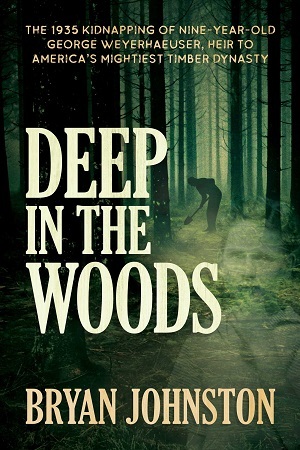
In 1935, nine-year-old George Weyerhaeuser, heir to one of the wealthiest families in America, is snatched off the streets two blocks from his home. The boy is kept manacled in a pit, chained to a tree, and locked in a closet. The perps—a career bank robber, a petty thief, and his nineteen-year-old never-been-in-trouble Mormon wife—quickly become the targets of the biggest manhunt in Northwest history. The caper plays out like a Hollywood thriller with countless twists and improbable developments. Perhaps the most astonishing thing of all, though, is how it all ends.
Publish Date: September 2021
My ThoughtsCrime was a lot easier to get away with in 1935, but even then it wasn’t wise to kidnap a wealthy family’s child. And these kidnappers were far from the wisest criminals of their time.
I’d call this book creative nonfiction. The facts are well researched and represented, but the author takes a lot of liberties with dialogue, moods, and thoughts, so the story reads like a crime novel.
I love historic true crime that fully immerses me in the era, and Bryan Johnson does that exceptionally well. I could envision all of the events as they played out.
My only issue is that I felt the author presumed too much regarding the kidnappers’ roles in events, which wasn’t backed up by evidence. This is particularly true of Margaret, the wife of one of the kidnappers. Johnson portrays her from start to finish as the obedient, somewhat dense and oblivious, mormon wife who never questions male authority. This might be true, but there are alternatives. She could have remained silent out of fear or she could’ve been complicit out of desire for the money she so eagerly spent. I just didn’t see any facts backing up the blind obedience theory.
Overall, though, I found this to be a well written, fascinating story.
*I received a review copy from Post Hill Press.*
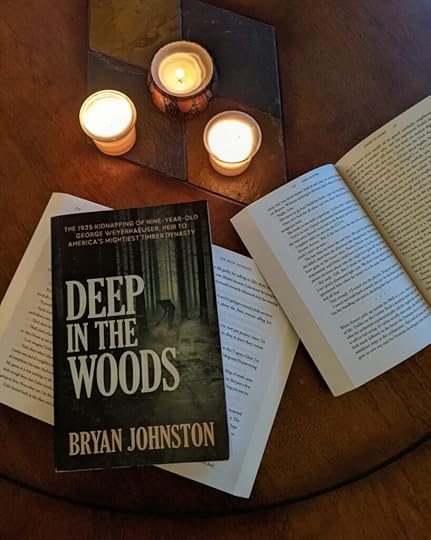
The post Book Review — DEEP IN THE WOODS: The 1935 Kidnapping of Nine-Year-Old George Weyerhaeuser, Heir to America’s Mightiest Timber Dynasty by Bryan Johnston appeared first on Quiet Fury Books.
Book Review — DEEP IN THE WOODS: The 1935 Kidnapping of Nine-Year-Old George Weyerhaeuser, Heir to America’s Mightiest Timber Dynasty by Bryan Johnson

In 1935, nine-year-old George Weyerhaeuser, heir to one of the wealthiest families in America, is snatched off the streets two blocks from his home. The boy is kept manacled in a pit, chained to a tree, and locked in a closet. The perps—a career bank robber, a petty thief, and his nineteen-year-old never-been-in-trouble Mormon wife—quickly become the targets of the biggest manhunt in Northwest history. The caper plays out like a Hollywood thriller with countless twists and improbable developments. Perhaps the most astonishing thing of all, though, is how it all ends.
Publish Date: September 2021
My ThoughtsCrime was a lot easier to get away with in 1935, but even then it wasn’t wise to kidnap a wealthy family’s child. And these kidnappers were far from the wisest criminals of their time.
I’d call this book creative nonfiction. The facts are well researched and represented, but the author takes a lot of liberties with dialogue, moods, and thoughts, so the story reads like a crime novel.
I love historic true crime that fully immerses me in the era, and Bryan Johnson does that exceptionally well. I could envision all of the events as they played out.
My only issue is that I felt the author presumed too much regarding the kidnappers’ roles in events, which wasn’t backed up by evidence. This is particularly true of Margaret, the wife of one of the kidnappers. Johnson portrays her from start to finish as the obedient, somewhat dense and oblivious, mormon wife who never questions male authority. This might be true, but there are alternatives. She could have remained silent out of fear or she could’ve been complicit out of desire for the money she so eagerly spent. I just didn’t see any facts backing up the blind obedience theory.
Overall, though, I found this to be a well written, fascinating story.
*I received a review copy from Post Hill Press.*

The post Book Review — DEEP IN THE WOODS: The 1935 Kidnapping of Nine-Year-Old George Weyerhaeuser, Heir to America’s Mightiest Timber Dynasty by Bryan Johnson appeared first on Quiet Fury Books.
New Photo-Illustrated Anthology — NEW YORK: Give Me Your Best or Your Worst by Elizabeth Crowens

 An Anthology and Celebration of the Big Apple
An Anthology and Celebration of the Big Apple
I’m an unabashed, unapologetic lover of New York City, my hometown, and New York: Give Me Your Best or Your Worst is right up my dark, deserted alley. New York’s at its best when you sneak up on it, glance at its sideways, or let it glance sideways at you. The pros and photos in this collection all show New York’s best, even when they purport to be showing its worst; in NYC, that’s how we roll. A fine addition to your New York bookshelf, a collection to savor.
~ SJ Rosen, best-selling author of The Art of Violence
Book Details:Genre: Coffee Table book of Photography with Short Stories
Published by: Atomic Alchemist Productions, LLC
Publication Date: Oct 25, 2021
Number of Pages: 150
ISBN: 1950384136, 9781950384136
Purchase Links: Amazon | BookBaby | The Mysterious Bookshop | Goodeareads
Read the Intro:
It is daunting to be asked to say something about New York City that hasn’t already been said with more eloquence than I could muster. As with many of the writing gigs I’ve accepted without carefully considering the consequences, I suppose I would have been better off letting someone else tilt at this windmill. With all due respect to Don Quixote, here goes.
My initial inclination was to do something about how New York City, because of its geography, is fated to be a place of stark contradictions: of churning and yearning, of inclusion and exclusion, of acceptance and denial. Unlike other cities, New York cannot expand outwards, only upwards. While that sounds great and may make for glorious postcards of a majestic, everchanging skyline to send to the folks back home, it leaves out New York City’s most valuable commodity—its people.
I could have written about the unknown or unseen New York, the scores of little islands—some populated, some not—in Jamaica Bay, in the harbor, in the East River, in the Hudson. Places like Ruffle Bar. Ruffle Bar? Google it. Places once home to psychiatric and typhoid quarantine hospitals. Buildings abandoned or demolished. Islands whose only residents are the dead buried there and forgotten. Interesting, certainly, but again it would have left out the thing that makes New York City what it is.
As a crime fiction author who sets much of his work in New York—largely in Brooklyn and Manhattan—I have done countless panels and interviews about the city. My friend and award-winning colleague, Peter Spiegelman, says that setting is the soil in which you grow your characters. He is so right. Ask any author worth his, her, or their salt, and they will tell you that a book that can be set anywhere isn’t much of a book at all. A book must be of its place. So too must a person.
New York City isn’t one place. It is a thousand places, ten thousand places. And because it is all those places, its people are different neighborhood to neighborhood, sometimes street to street. Certainly, house to house, apartment to apartment. Do we shape the place or does the place shape us? Instead of doing an overview, a sort of general discussion of this question, I think it better to talk about one place—Coney Island—and how it shaped one person—me.
I grew up in the shadow of Coney Island Hospital, about a mile or so away from the amusement park. I was right on the border of Brighton Beach, Gravesend, Sheepshead Bay, and Coney Island. I could explain how each of these neighborhoods differ, how, for instance, Sheepshead Bay is, for all intents and purposes, a fishing village. But no, not here, not now. At one point in my life or other, I have claimed to be from all these places. Yet it is Coney Island that resonates.
When I was four, my dad—a bitter, blustery, and angry man—was diagnosed with an aggressive bone sarcoma which he battled to a standstill for thirty plus more years. After his initial round of surgery and treatment, he was instructed to not do any activities that might jar or adversely affect his leg. Yet on summer Sundays, he would tell my mom that he was taking me for a car ride. We took car rides, alright, straight into Coney Island.
He would put me on the kiddy rides, take me to Nathan’s Famous, buy me pistachio soft serve. Then, in one of the few acts of true defiance I ever saw from him, he would get on the carousel and grab for the brass rings. On one of these Sundays, he pointed to the Parachute Jump. The “Jump” rose into the air two hundred and sixty feet. All orange steel, it looked like a cross between the Eiffel Tower and the skeleton of a giant umbrella.
“When that ride opened up,” he said, “my best pal Charlie and me got on it. The parachute dropped a few feet and then … nothing. We were stuck up there for forty-five minutes just hanging in the air. It was great.”
Of course, by then, the Parachute Jump, once part of Steeplechase Park, had been closed for years, its parachutes and rigging long gone. That day, those days, have stayed with me ever since. And when, as a teenager, I would go back to Coney Island with my friends, get high and ride the Cyclone, I would always look up at the Parachute Jump. It came to symbolize my dad to me. Mighty, impressive, but abandoned, and powerless. I loved my dad because I could see past his bluster. He let me see past it. All because of those few Sundays in Coney Island.
As if by osmosis, Coney Island began imposing itself in my work. My series character, Moe Prager, worked in the Six-O precinct in Coney Island. Scene after scene in the nine Moe books take place there. Even twenty-plus books later, in my new series, I cannot escape the gravity of Coney Island. It calls to me in a way I cannot explain other than to say it is romance in the way the Romantic poets understood it.
In my Edgar Award–nominated short story “The Terminal,” I wrote this:
“…He liked how Coney Island displayed its decay as a badge of honor. It didn’t try to hide the scars where pieces of its once-glorious self had been cut off. Stillwell Avenue west was like a showroom of abandonment, the empty buildings wearing their disuse like bankrupted nobility in frayed and fancy suits. He had come to the edge of the sea with the other last dinosaurs: the looming and impotent Parachute Jump, the Wonder Wheel, Nathan’s, the Cyclone.”
I could never have written those words in that way had I grown up in Washington Heights or Rego Park. New York City poets and writers are shaped by their families, yes, but shaped as much by where as by who. That is the magic of New York. This book will shine a light on the rest of that magic. By the way, my children and I have slightly different tattoos of the Parachute Jump: My son and I on our forearms; my daughter on her triceps. In those tats my dad and the Coney Island that was will live on.
***
Introduction from New York: Give Me Your Best or Your Worst by Reed Farrel Coleman. Copyright 2021 by Elizabeth Crowens. Reproduced with permission from Elizabeth Crowens. All rights reserved.
About New York: Give Me Your Best or Your Worst: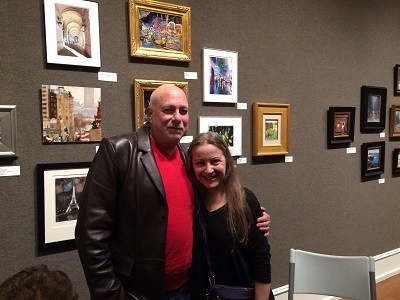 Writer and photographer, Elizabeth Crowens is one of 500 New York City-based artists to receive funding through the City Artist Corps Grants program, presented by The New York Foundation for the Arts (NYFA) and the New York City Department of Cultural Affairs (DCLA), with support from the Mayor’s Office of Media and Entertainment (MOME) as well as Queens Theatre.
Writer and photographer, Elizabeth Crowens is one of 500 New York City-based artists to receive funding through the City Artist Corps Grants program, presented by The New York Foundation for the Arts (NYFA) and the New York City Department of Cultural Affairs (DCLA), with support from the Mayor’s Office of Media and Entertainment (MOME) as well as Queens Theatre.
She was recognized for New York: Give Me Your Best or Your Worst, her photo-illustrated anthology, which brought her published book along with ten other authors to Mysterious Bookshop in Lower Manhattan at 58 Warren Street on Monday, October 25, 2021 at 6:30 p.m. for an in-store event and author signing along with a simultaneous Facebook Live presentation and recording for Jim Freund’s WBAI program Hour of the Wolf.
Tour Participants:
Visit the stops on this tour for more great reviews, interviews, and guest posts from our hosts and authors!
Get More Great Reads at Partners In Crime Virtual Book Tours
The post New Photo-Illustrated Anthology — NEW YORK: Give Me Your Best or Your Worst by Elizabeth Crowens appeared first on Quiet Fury Books.
November 4, 2021
New Release Spotlight — DREAM STALKER by Nancy Gardner


Lily Scott had vowed never to dream-walk-again….
Lily is a contemporary Salem witch who descends from a long line of witches born with the power to walk into other people’s dreams to fight crime. But her disastrous first dream-walk almost killed her, and she vowed never to repeat the painful experience.
Now her daughter is falsely accused of murder, and the only way to clear her would be for Lily to enter the dreaming mind of the real killer, risking confrontation with the deadly Dream Stalker.
Can Lily summon the courage?
Book Details:Read an excerpt:Chapter 1Salem, Massachusetts—October 1, 2013Genre: Paranormal Mystery
Published by: Bowker
Publication Date: June 1st 2021
Number of Pages: 257
ISBN: 1733919945 (ISBN13: 9781733919944)
Series: Dream Stalker, #1
Purchase Links: Amazon | Reedsy | Goodreads | Audible | Apple Play
I stumbled through the early morning fog blanketing Salem’s Gallows Hill, hurrying to the oak tree that my maternal grandmother, Sadie MacAskill, loved. When I was a child, she’d taught me that witches like ourselves derive energy from working with green, growing plants and trees. I could still feel our arms stretched around the oak’s trunk, listening for the pulsing power within it.
“Feel Mother Earth’s wisdom rising,” she’d said.
I’d never needed wisdom more. The plan I’d cooked up with an old friend had gone terribly wrong. Kitty was supposed to bring my estranged daughter, Sarah, to dinner. Sarah’s favorite dinner, creamy chicken pesto and pasta, was baking in the oven when I got the call.
“Kitty hasn’t come home, and I’m not ready to see you without her. I may never be ready,” Sarah said, her voice cold and unforgiving. She hung up before I could reply.
When I called her back, she refused to answer. If my husband, Sam, had still been alive, he’d have known what to do. But he’d died two years ago.
It was long after midnight when I threw the cold casserole down the disposal and crawled into bed. When sleep proved impossible, I paced the empty rooms of our Chestnut Street home until dawn, then grabbed the nearly empty bottle of homemade dandelion brandy as an offering to Nana’s spirit and rode my Vespa to the park atop Gallows Hill.
Exhausted and headachy, I forgot to watch my step and tripped over a rock. I managed not to fall, but the bottle flew out of my hand. I watched it shatter, watched the last golden dregs seep into the grass. I felt like I was watching my relationship with my daughter ebb with it.
As I dropped shards of glass into the nearby trash can, the wind seemed to whisper that I didn’t deserve to find the wisdom I needed. I’d failed Nana, and I’d failed my daughter.
“Enough self-pity.” I pulled my leather jacket tighter and scurried past the crumbling pavilion and rusting flagpole to the ancient oak. Once again, I pressed my cheek to the rough bark, closed my eyes, and waited. The bark pulsed. A crow landed in the branches above me, cawing and shaking loose a shower of dead leaves. I opened my eyes, and for a moment, Nana’s face wavered before me. Then she was gone, leaving me with my questions unanswered.
My cell vibrated. Who would call me this early? Sarah? Kitty with an explanation? I checked the screen. Neither. Honey Campbell, my landlord and a good friend. She owned the building on Pickering Wharf where we both ran our businesses. Her barbershop took up the first floor. My herbal studio, Healing Thyme, sat above it.
“Hi, Honey. What’s up.”
“Thought you’d want to know your friend, Kitty, came looking for you,” Honey said in her soft Scottish brogue. “And bye-the-bye, she looked like shite. She stumbled off toward Moe’s. You might yet find her there.”
Two months earlier, Kitty had stopped me on the street. I’d taken her for a panhandler and almost turned her away. Then she said, “Lily, don’t you remember me? My parents took us to New York to see West Side Story. We had the best time.”
We’d shared a cup of coffee and Kitty shared her story. She’d been a high school biology teacher until she’d been diagnosed with early-onset Alzheimer’s. The disease had taken everything from her: her teaching career, her home, her reason for living. She’d ended up lost on the streets.
Things had taken a turn for the better for Kitty when she found a permanent bed at St. Bridget’s Homeless Shelter and, because of the doctor who volunteered his services there, Kitty’s memory was making a remarkable improvement.
“Thanks, Honey. I’m on my way.” I dashed back to the Vespa, strapped on my helmet, and started the engine. Usually, the thrum of the engine beneath me and the slapping rhythm of my braid tapping against my back soothed me. Not this morning. I pressed the throttle and hurried to Pickering Wharf, determined to find out what had gone wrong last night.
***
Excerpt from Dream Stalker by Nancy Gardner. Copyright 2021 by Nancy Gardner. Reproduced with permission from Nancy Gardner. All rights reserved.
About the Author Nancy Gardner writes cozy mysteries with a paranormal twist. The first novel in her new series, Dream Stalker, tells the story of Lily Scott, a contemporary Salem witch who walks into people’s dreams to fight crime. One reviewer called it a gripping tale of witchcraft, family loyalties, and the cost of seeking justice. Her most recent short story, “Death’s Door,” was selected to be included in the 2021 anthology, Malice Domestic 16: Mystery Most Diabolical. She lives near Boston with her writer husband, David.
Nancy Gardner writes cozy mysteries with a paranormal twist. The first novel in her new series, Dream Stalker, tells the story of Lily Scott, a contemporary Salem witch who walks into people’s dreams to fight crime. One reviewer called it a gripping tale of witchcraft, family loyalties, and the cost of seeking justice. Her most recent short story, “Death’s Door,” was selected to be included in the 2021 anthology, Malice Domestic 16: Mystery Most Diabolical. She lives near Boston with her writer husband, David.
NancyGardnerAuthor.com
Goodreads
BookBub – @nancygardner5
Instagram – @ngauthor
Twitter – @NGardner_author
Facebook – @NancyGardnerAuthor
Tour Participants:
Visit these other great hosts on this tour for more great reviews, interviews, guest posts, and giveaways!
Join In:This is a rafflecopter giveaway hosted by Partners in Crime Virtual Book Tours for Nancy Gardner. There will be TWO (2) winners for this tour. Each of the Two (2) winners will receive a $10 Amazon.com gift card (US ONLY). The giveaway runs November 1 through December 5 2021. Void where prohibited.
Get More Great Reads at Partners In Crime Virtual Book Tours
The post New Release Spotlight — DREAM STALKER by Nancy Gardner appeared first on Quiet Fury Books.
November 3, 2021
New Release Spotlight — WHAT THEY DIDN’T BURN: Uncovering My Father’s Holocaust Secrets by Mel Laytner
What if you uncovered a Nazi paper trail that revealed your father to be a man very different from the quiet, introspective Dad you knew…or thought you knew?
Growing up, author Mel Laytner saw his father as a quintessential Type B, passive and conventional. As he unearthed the documents the Nazis didn’t burn, another man emerged—a black market ringleader and wily camp survivor who made his own luck.
Like Laytner’s father, every Holocaust survivor has an amazing story. Ifthey didn’t, they wouldn’t have survived. Yet if the stories sound too amazing, they risk being dismissed as exaggerations, or worse. At a time when the Holocaust itself risks becoming a cliché, how do we show the truth, especially to younger generations further and further removed from the war?
Laytner lets the Nazis do it.
The timeline of Nazi documents they didn’t burn tracks Josef Dolek Lajtner from home to ghettos, slave labor, concentration camps, death marches, and more. In corroborating his more unbelievable stories, these tattered papers also corroborate the stories of Lajtner’s camp comrades, those who survived…and those who did not.
Melding the intimacy of personal memoir with the rigors of investigative journalism, What They Didn’t Burn is an inspirational story of resilience and redemption, of desperate refugees turned hopeful immigrants rebuilding shattered lives in America. It is an investigative memoir of a reporter’s quest, a son’s revelation, and a father’s unlikely saga of survival — confirmed by the Nazis themselves.
PURCHASE LINKS:
Amazon: https://bit.ly/What-They-Didnt-Burn-Amazon
IndieBound: https://www.indiebound.org/book/9781684631032
Barnes & Noble: https://www.barnesandnoble.com/w/what-they-didnt-burn-mel-laytner/1138488967
Google Play: https://play.google.com/store/books/details?id=bc4PEAAAQBAJ
Apple Books: https://books.apple.com/us/book/what-they-didnt-burn/id1545536368
Goodreads: https://www.goodreads.com/book/show/57175034-what-they-didn-t-burn
Book Depository: https://www.bookdepository.com/What-They-Didnt-Burn-Mel-Laytner/9781684631032
Chirp: https://www.chirpbooks.com/audiobooks/what-they-didn-t-burn-by-mel-laytner
Scribed: https://bit.ly/SCRIBED-what-they-didnt-burn
Audible: https://bit.ly/Audible_what-they-didnt-burn
Chapter 1
WEST 83RD STREET
The only time I heard anyone call my father a bastard was about a month after he died.
I was in an open-air café overlooking the Western Wall in the Old City of Jerusalem, sipping iced coffee and eating apple cake with Walter Spitzer, my father’s old artist friend from the days before, during, and after “the camps.”
Walter had flown in from Paris for business and had brought his daughter along to see the Holy Land. I was a reporter for NBC News and had returned from Dad’s funeral in New York a couple of weeks earlier, still abraded and raw from his unexpected death.
Walter smiled when I pulled out my reporter’s Sony cassette recorder.
To his daughter: “So he wants to know how his father survived.”
To me: “I’ll tell you how. Dolek was a bastard. A real bastard. You had to be if you wanted to live.”
I was stunned, and it showed. This wasn’t the quintessential type-B father of my childhood. That man was thoughtful and considerate, patient and gentle. [image error]
Walter cut off my stuttering protests with a laugh. “Dolek was a smuggler, a great smuggler—he smuggled everything.”
In the forced labor camps, the Germans would appoint a Jew as Judenälteste, roughly the Jewish Elder or Senior Jew, charged with maintaining order inside the wire with his own staff. Walter said a German guard had caught my father with a bottle of schnapps he had just traded with a Pole. The guard dragged Dad to the Judenälteste. “The German tells him, ‘Look, this is the man you are protecting—making business, black business, black-market business.’
“The Judenälteste screams at Dolek, ‘You son of a bitch. I protect you and you do this to me?’ And he punches your father, right-left-right. Knocks him down. Then he gives him a big shtup [kick] in his ass. ‘Get out of my sight or I’ll kill you.’ He keeps kick- ing and screaming. Dolek crawls away on his hands and knees. And the SS man was happy to see this, a Jew beating another Jew.”
Walter paused for a sip of iced coffee, but really for dramatic effect. “And that’s how he saved your father’s life.”
“Saved?” I ask.
“Yes, of course. Otherwise, the German would have killed Dolek like a fly. Is this not great? Fantastic, no?”
By now I’m a little off balance. My father never mentioned this incident. Evidently there was more to Dad’s stories than he ever let on. What else didn’t I know? I wanted to find out more. Why else bring my reporter’s tape recorder to the meeting? But the wound of his sudden death was still too fresh, too painful. It would need to heal some before I began picking at those scabs.
I put the Spitzer cassette into an old wooden humidor I used to store trinkets and memorabilia, promising myself I’d get back to it. It was a promise that took twenty years to keep.
(From)
Chapter 2
FINDING BILL BALL
…
Inside is a copy of this document:
[image error] [image error] [image error] [image error] [image error] [image error] [image error] [image error]
No doubts. None at all. My father’s calligraphic signature hugs the lowerleft corner. His tattoo number—177904—the upper right. It is my father’s Häftlingspersonalbogen, the pris- oner registration form, filled out when Blechhammer became a subcamp of Auschwitz on April 1, 1944.
Here was Dad’s life, reduced to a single page. Born August 11, 1911. Five feet seven inches. Black hair and brown eyes. A long face, a straight nose, a “normal” mouth and “mid-sized” ears and missing two teeth. He had no infectious diseases or ill- nesses, belonged to no political party, collected no pension. He had presumably not committed any criminal violations or criminal political acts. While the “reason” for his arrest was blank, the top of the form noted “type of arrest: Jew.”
In 1938, as part of the notorious Nuremberg racial laws, the Nazis adopted Law #174, which required all Jewish men to add “Israel” and all Jewish women to add “Sarah” to their names so they could be more readily identified as Jews. Sure enough, printed boldly on the form next to my father’s name was “Israel.”
Dad lied to the Nazis twice. He listed his mother’s where- abouts as “unknown” even though she was alive and well in Brooklyn, where she had gone to visit her daughter the year before the war broke out. By April 1944, American bombers were pounding German cities. Announcing that his mother was in the United States would have ensured him a beating, or worse. He also claimed only a fourth-grade education. In fact, he had graduated public high school in Dabrowa. Diminishing his educational background had its advantages. Dad often told how Nazi guards took particular pleasure in humiliating “uppity” educated Jews.
His profession was listed as “electro-welder” and his address as 40 Louge Street in the hamlet of Strzemieszyce, pronounced Shtre-ma-shitz-eh. Consulting a map, I see it would have been about a ten-minute tram or bicycle ride from his hometown of Dabrowa, an industrial city in the Dabrowa Basin, known locally as Zaglebie, close to Germany in southwestern Poland.
How did Dad end up in Strzemieszyce? I remember stories about the family’s big house in Dabrowa built by his father. He shared that house with his half brothers and sisters. Why wasn’t he living at home?
I study the form as if it were a religious relic, a talisman from antiquity. Dad brought back no photographs or war souvenirs. He received no purple hearts, medals, or citations celebrating his survival. Here is a document—a Nazi document—that told more about my father at a specific time and place than he ever had.
Here is independent corroboration from the most unlikely source that he had been seized, enslaved, branded, and sentenced to the most notorious factory of death devised by man. No longer does his story depend on fading memories of a fading generation.
Well, now. This changes everything . If one such relic exists, might not others? What truths might they hold? What secrets might they reveal?
—
Chapter 13
BREAD AND OTHER SURVIVAL STORIES
Dad loved making sandwiches and I loved watching him make them. Like a penitent in prayer, he’d sway to and fro assessing each ingredient assembled before him on the red-and-gray Formica table.
“Bread is the most egalitarian of foods,” he’d say. “It is both spiritual and secular, a promise of heavenly salvation and a reward for earthly labor.”
I’d nod. I’d heard Dad’s bread-as-life discourses many times growing up.
“Think about it. Bread is godly, bread is family, bread is penance. We welcome the Sabbath with bread and wine, consecrate our homes with bread and salt, feed prisoners bread and water.” He paused. “Of course, not all breads are created equal.”
He lifted a braided challah loaf from the wicker basket. “Challah is both spiritual and special. Back in Poland, this was Sabbath bread. It was expensive—made with white flour, many eggs, and sugar. Only rich people ate challah during the week. The kihila [community council] would distribute loaves of challah to poor people for Shabbos.”
He slid a round, dark pumpernickel from its bag of white waxed paper. “Peasant bread is more like this, but coarser and much larger, maybe five pounds. It is primal and organic, dark and strong, round and full.” He brought the loaf to his nose and inhaled deeply. “Ah! We ate a lot of bread like this.”
With a serrated bread knife, he cut four thick slices of pumpernickel so perfectly even, the surgery could have been performed by the deli machine down the street. He sliced two of Mom’s “special” sautéed hamburgers into mirrored halves. Using a small paring knife, he cut a sour garlic pickle (never a half-sour or dill) into thin, translucent slices. A dollop of Heinz ketchup went on the bottom slice of bread, then came the meat, the pickles, and a final dollop of Heinz on top (“Why should the upper teeth be deprived?”). He pressed the top slice of pumpernickel down hard onto the sandwich, forcing the meat, pickles, and ketchup to bond with the bread.
We sat together in silence at that gray-and-red table, eating these delicious sandwiches of black bread and Mom’s burgers. If the mood was right, if Mom and my kid brother were out, my father occasionally talked a little more about the war.
“Now ‘camp bread’ was democratic and brutal. Democratic, because it was shaped like a brick so it was easy to divide into four equal parts. Brutal, because a loaf weighed a kilo, about two pounds. This meant we each got about eight ounces of bread as our daily ration.”
About the Author Mel Laytner was a reporter and editor of hard news for some twenty years, much of it as a foreign correspondent covering the Middle East for NBC News and United Press International.
Mel Laytner was a reporter and editor of hard news for some twenty years, much of it as a foreign correspondent covering the Middle East for NBC News and United Press International.
His first full-time reporting job was with UPI covering all manner of urban mayhem in New York City, his hometown. After a stint as a one-person suburban bureau chief, he moved to the General Desk and became the “slot man” editor, responsible for selecting and editing the day’s top stories for UPI’s 400 afternoon newspaper clients.
His first foreign assignment was London. A year later, UPI moved him to Tel Aviv and a year after that, he was named Jerusalem Correspondent. NBC News recruited Mel as its Middle East Radio Correspondent.After eight grinding years in the Middle East, the prestigious Knight-Bagehot program awarded Mel a fellowship in Business and Economic Journalism, which included a year’s residency at Columbia’s Graduate School of Business. Mel holds Master’s degrees from the Columbia Graduate School of Journalism, and from Columbia’s School of International and Public Affairs.
He lives in New York City with his wife, an artist and teacher, and is the father of three daughters.
Connect on Facebook: https://www.facebook.com/MelLaytnerAuthor
The post New Release Spotlight — WHAT THEY DIDN’T BURN: Uncovering My Father’s Holocaust Secrets by Mel Laytner appeared first on Quiet Fury Books.
November 2, 2021
Book Review — MY FIRST THIRTY YEARS: A Memoir by Gertrude Beasley
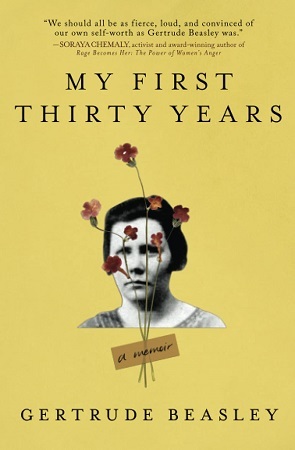
Shortly after its 1925 publication, Gertrude Beasley’s ferociously eloquent feminist memoir was banned and she herself disappeared under mysterious circumstances. Though British Nobel Prize winner Bertrand Russell called My First Thirty Years “truthful, which is illegal” and Larry McMurtry pronounced it the finest Texas book of its era, Beasley’s words have been all but inaccessible for almost a century―until now.
Beasley penned one of the most brutally honest coming-of-age historical memoirs ever written, one which strips away romantic notions about frontier women’s lives at the turn of the 20th century. Her mother and sisters braved male objectification and the indignities of poverty, with little if any control over their futures. With characteristic ferocity, Beasley rejected a life of dependence, persisting in her studies and becoming first a teacher, then a principal, then a college instructor, and finally a foreign correspondent.
Along the way, Beasley becomes a strident activist for women’s rights, socialism, and sex education, which she sees as key to restoring bodily autonomy to women like those she grew up with. She is undaunted by authority figures but secretly ashamed of her origins and yearns to be loved. My First Thirty Years is profoundly human and shockingly candid, a rallying cry that cost its author her career and her freedom.
Her story deserves to be heard.
Published: September 2021
My ThoughtsMy First Thirty Years provides a fascinating and rare female perspective of everyday life for a poor family from the late 1800s through the early 1920s.
Historical pieces from this period typically come to us from upper class, white males. Gertrude gives us a gift with her long-lost memoir, inviting us back in time to experience her rough, raw, disturbing reality.
I have to admit, I didn’t like Gertrude. She tends toward narcissism and lacks empathy. Her viewpoint is myopic. She rarely writes about anything that doesn’t directly involve her at its center, so we don’t get much sense of national or world politics, or even societal events. But this narrow focus allows us to clearly see the gender, class, and economic imbalance she experiences. Perhaps more importantly, we see how society not only failed but ignored and abandoned families in crisis.
This is a difficult read. Gertrude doesn’t hold back on details of sexual abuse, real or imagined. It’s easy to see why this memoir created an uproar when published in 1925. We also see the shadow of mental illness and her blatant nonconformity that made it all too easy for the patriarchy to lock Gertrude away, keeping her silent for the remainder of her life.
*I received a free copy from Sourcebooks.*

The post Book Review — MY FIRST THIRTY YEARS: A Memoir by Gertrude Beasley appeared first on Quiet Fury Books.
November 1, 2021
Book Review — THE SILENT COMPANIONS by Laura Purcell
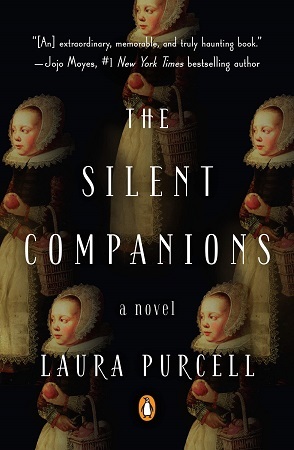
Some doors are locked for a reason.
When Elsie married handsome young heir Rupert Bainbridge, she believed she was destined for a life of luxury. But pregnant and widowed just weeks after their wedding, with her new servants resentful and the local villagers actively hostile, Elsie has only her late husband’s awkward cousin for company. Or so she thinks. Inside her new home lies a locked door, beyond which is a painted wooden figure—a silent companion—that bears a striking resemblance to Elsie herself. The residents of the estate are terrified of the figure, but Elsie tries to shrug this off as simple superstition—that is, until she notices the figure’s eyes following her.
A Victorian ghost story that evokes a most unsettling kind of fear, The Silent Companions is a tale that creeps its way through the consciousness in ways you least expect—much like the companions themselves.
The Silent Companions is atmospheric gothic horror that goes from mildly unsettling to full-on chilling in a short span.
We have two timelines—one in the 1600s and one in the 1800s—that slowly intersect before crashing into each other.
I loved the historical aspect of this story, which shows us how little control women had over their own lives, and how easily men could lock them away when they became inconvenient. For me, this was as much a part of the horror as what was happening inside the home.
The Silent Companions is a dark, unique, well written story that will stick with me for a long time.

The post Book Review — THE SILENT COMPANIONS by Laura Purcell appeared first on Quiet Fury Books.

